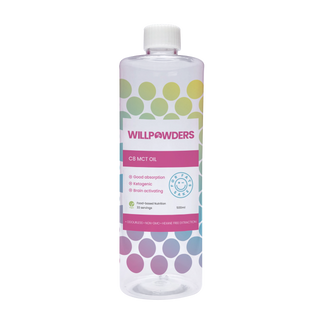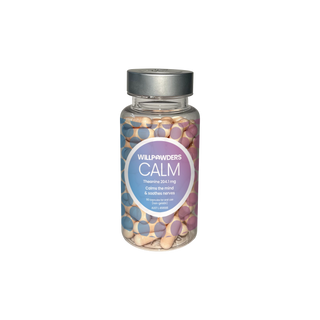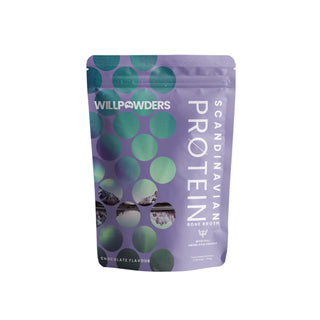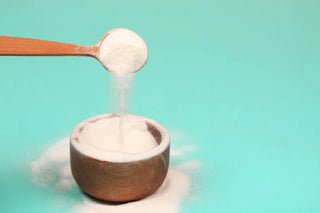
Collagen
The Benefits of Collagen
Why Take a Collagen Supplement?
Collagen: A Nutritional Throwback or Modern Must-Have?
Collagen seems to be everywhere these days—even in that infamous middle aisle of our favourite discount supermarket! But what exactly is it? Why is it suddenly so trendy? And what separates the bargain finds from the premium products? Let’s unpack collagen, from its history in the kitchen to its potential health benefits today.
What is Collagen, and Why Should We Supplement with It?
Before the 1970s, getting collagen in our diets was par for the course. Families often boiled bones and roasted meat for hours, extracting natural collagen in the process. Not a single bit of the animal was wasted, and in those days, dinner etiquette wasn’t just about manners—it was about making sure you cleaned your plate!
Using the whole animal created nutrient-rich meals, with collagen-packed bone broth at the heart. Back then, processed foods were rare, and meals were nutrient-dense. Today, diets have drifted away from whole-animal cooking, so it’s no wonder we’re looking at collagen supplements to fill in those gaps.


The Low-Fat Craze and the Drop in Natural Collagen Intake
Then came the late ’70s, and suddenly, low-fat diets were the new health craze. Lean cuts of meat and convenience foods became all the rage, and as a result, we strayed from traditional cooking. The processed food industry jumped on board, and suddenly we were trading nutrient-dense meals for easy, packaged options—and losing out on natural sources of collagen.
Fat and Collagen: The Perfect Pairing
The very idea of consuming fat has been demonised for years, but it’s actually a key player in health. Research suggests that healthy fats, especially in whole, unprocessed forms, may help us feel full, support cognitive function, and provide the building blocks that collagen relies on.
Collagen Supplements: A Modern Health Hack?
Enter collagen supplements—a convenient way to sneak some amino acids into your diet without changing the flavour of your food. Collagen peptides, which are hydrolysed for easy absorption, may offer the same benefits as traditional bone broth but in a more concentrated and convenient form.
These tiny peptides are resilient (heat won’t break them down), dissolve in most liquids, and are tasteless. Adding them to soups, sauces, or your morning coffee is a simple way to up your collagen intake.
Marine vs. Bovine Collagen
Marine collagen is widely marketed as a premium product, but it tends to come with a higher price tag and a “fishy” taste that some brands mask with additives. While marine collagen is a rich source of Type I collagen, which may support skin, hair, and nails, research suggests that bovine collagen—which includes both Type I and Type III—could provide broader benefits, such as supporting gut health and maintaining joint health, thanks to its amino acid profile. WillPowders Bovine Collagen Powder is sourced from Swiss grass-fed cows and made to be affordable, all while offering a premium, clean, and traceable product.


Tasteless and Family-Friendly
Bovine collagen peptide powder is flavourless, which makes it ideal for “sneaky nutrition.” Pop a scoop into sauces, soups, or even your kid’s pasta (over 5s only, please) without them noticing! It’s an easy way to add some amino acid goodness into everyday meals.
Not Just Skin Deep: Collagen’s Potential Health Benefits
Collagen is often touted for skin, hair, and nails, but its benefits may go beyond beauty. Regular intake could help support joint lubrication, making exercise more comfortable, and may even assist with easing minor aches that come with age. For those with arthritis, collagen might provide some level of support for joint health as discussed here.
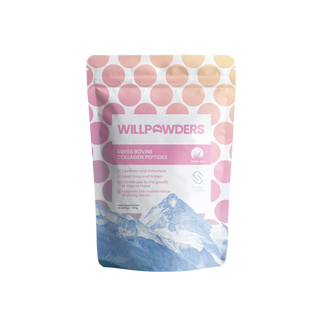

To Acids in Collagen: A Nutritional Powerhouse
Collagen has an impressive amino acid profile, which may help stave off cravings and support satiety, making it potentially useful for those practising intermittent fasting or aiming to lose weight. Adding a small amount to your morning coffee may even help extend your fasting window without disrupting the body’s fasting state. Fasting may help activate autophagy, a process that removes damaged cells and supports cellular health.
Collagen may contribute to satiety due to its nature as a protein. According to this study, high-protein diets are linked to increased levels of satiety hormones like glucagon-like peptide-1 and cholecystokinin, while also suppressing ghrelin, a hormone that triggers hunger.
A 2008 study suggests that higher protein intake can boost thermogenesis, which impacts satiety and energy expenditure. The study also notes that diets higher in protein may stimulate muscle protein anabolism, which helps retain lean muscle mass and improve the metabolic profile.
So, there you have it!
You can either boil bones for hours on end or simply add a scoop of bovine collagen powder to your favourite foods and drinks. Collagen may help keep you looking and feeling vibrant, inside and out, and it’s easy to include in the family’s diet.
Here’s to providing your whole body with the building blocks it needs to stay well!
Further Product Information
Hydrolysed Bovine Collagen Peptides
Use daily. Add to any hot or cold liquid or baked goods. Suggested daily consumption 1-15g. If you are pregnant, breastfeeding or taking medication, please consult a health practitioner. Not suitable for children under 5. Not suitable for vegetarians or vegans.
Disclaimer
Our blogs are written with love in the hope that they go some way in helping you feel like the rockstar you are, and whilst we do our due diligence, research like maniacs and fact check our stuff, we know everyone’s journey is different. They are intended to educate and empower you, not usurp medical advice. We would never advise you to stop, adjust, or modify any prescription medication without the direct supervision of your healthcare practitioner, but don’t be afraid to talk to your doctor about your new found knowledge, brought to you by the marvels of nature because they don't know everything! Blogs are always informed by Davinia but often written by a member of the team. Not all blogs reflect Davinia's experiences and sometimes provide alternative perspectives
 Collagen
Collagen
 Protein
Protein
 MCT
MCT
 Electrolytes
Electrolytes
 Vitamins & Minerals
Vitamins & Minerals
 Nootropics
Nootropics
 Accessories
Accessories
 Books
Books







